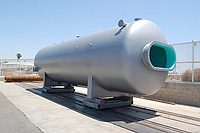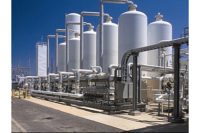Interline®9001 is a new bimodal epoxy coating for the cargo tanks of chemical tankers. With enhanced cargo resistance, zero absorption for many cargoes and fewer cycling restrictions, the coating reportedly simplifies the carriage of a range of liquid cargoes, optimizing vessel earning potential.
Modern chemical tankers of IMO ship type I, II and III are designed and equipped to handle a wide range of liquid cargoes, ranging from relatively innocuous materials to more aggressive types. The most commonly used type of coating on mild steel tanks is epoxy phenolic, which provides broad cargo carriage capability but can absorb and retain certain cargoes, creating a difficult cleaning challenge to remove any absorbed cargo and to minimize the risk of contaminating subsequent cargoes. Zinc silicate coatings provide resistance to solvents and pure chemicals, but are limited in their use due to an inability to resist acids and alkalis. Interline 9001 is thus designed to deliver greater efficiency and flexibility in the operation of chemical tankers, easily switching from one cargo to the next with minimal downtime. It can carry the cargoes standard epoxy phenolic technology can, plus a further 25% of the large volume cargoes that it cannot and has over 60% fewer cycling restrictions.
The technology can open up new (previously restricted) cargo sequences for the carriage of aggressive cargoes, such as methanol to fatty acids to ethylene dichloride back to back, with no coating recovery required. Its low cargo absorption profile reportedly reduces the risk of contamination between cargoes and, combined with its smooth, glossy surface, can cut cleaning time and materials by up to 70% compared to standard epoxy phenolics or zinc silicates.
For more information, visit www.akzonobel.com.



